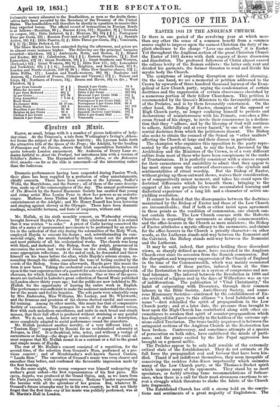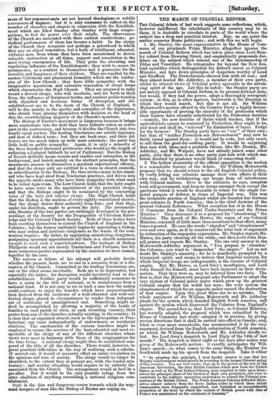TOPICS OF THE DAY.
A STER 1851 IN THE ANGLICAN CHURCH.
Is. there is one period of the revolving year at which more than any other the sense of a common benefit from a common source ought to impress upon the earnest Christi= the duty of im- plicit obedience to the charge " Love one another," it is Easter. Yet throughout the Anglican section of the great Christian Church the Easter of 1851 dawns with dark augury of fierce dissension and dissolution. The professed followers of Christ almost exceed the callous levity of the Roman soldiers : the latter only rent and divided his garments, the former threaten to rend and divide his mystic body the Church.
The symptoms of impending disruption are indeed alarming. On the one hand, we see a memorial or petition addressed to the Crown by upwards of three hundred thousand laymen of the Evan- gelical or Low Church party, urging the condemnation of certain doctrines and the suppression of certain observances cherished by a numerous portion of their fellow Churchmen. This petition is recommended by the Queen's Ministers to the favourable attention of the Prelates and is by them favourably entertained. On the other hand, the Bishop of Exeter, champion of the opposed or High Church party, no longer confining himself to protests and declarations of nonintercourse with his Primate, convokes a Dio- cesan Synod of his clergy, to invite their concurrence in a declara- tion that they "adhere, and by the blessing of God will continue to adhere, faithfully and at every hazard," to one of the most es- sential doctrines from which the petitioners dissent. The Bishop also seeks to obtain the counsel of the Synod on "other matters " affecting the Church at large and their diocese in particular. The champion who organizes this opposition to the party repre- sented by the petitioners, and, to say the least, favoured by the Archbishop and the Ministers of the Crown, is of a very different calibre from most of those who have been conspicuous in the ranks of Tractarianism. It is perfectly consistent with a sincere respect for their earnestness and amiability to admit that they appear to lay most stress upon the outward observances—the symbols and sentimentalities of ritual worship. But the Bishop of Exeter, without giving up these outward shows, waives their consideration, as of comparatively minor moment, and takes his stand upon the doctrinal differences which lie beneath them • bringing to the support of his own peculiar views the accumulated learning and dialectical experience of a long life and a character of active un- yielding resolution.
It cannot be denied that the discrepancies between the doctrines maintained by the Bishop of Exeter and those of the Low Church are irreconcileable ; that if both or either insist upon agreement in these points as the condition of communion, one church can- not contain them. The Low Church concurs with the Helvetic Churches in regarding the sacraments as simply commemorative, and the office-bearers in the Church as mere ministers ; the Bishop of Exeter attributes a mystic efficacy to the sacraments, and claims for the office-bearers in the Church a priestly character—in other words, as the Lutheran stands mid-way between the Romanist and the Calvinist, the Bishop stands mid-way between the Romanist and the Lutheran.
It may be said, indeed, that parties holding these discordant views, as sharply defined as now, have coexisted in the Anglican Church ever since its secession from the Romish communion. But the disruption and temporary suppression of the Church of England in the time of the Commonwealth, which was mainly occasioned by the contests of those parties, induced them at the time of the Restoration to acquiesce in a system of compromise and mu- tual tolerance. The interval between the Revolution in 1688 and the revival of religious zeal in the days of Wilberforce was an age of indifferentism. The publication of "Vital Christianity," the habit of cooperating with Dissenters, through their common labours in the Bible Society, Anti-Slavery Society, and nume- rous Missionary. Societies—confirmed by the establishment of Ex- eter Hall, which gave to this alliance "a local habitation and a name "—first rekindled the spirit of propagandism in the Low Church party; and at a later date, the pressure thus brought to bear upon the High Church has contributed along with other cir- cumstances to awaken that spirit of counter-propagandism which has displayed itself most earnestly in the holders of the extreme opi- nions called Tractarian. The truce tacitly acquiesced in between the antagonist sections of the Anglican Church at the Restoration has been broken. Controversy, and sometimes attempts at a species of persecution on both sides, have embittered the minds of parti- sans; and the panic excited by the late Papal aggression has brought on a general melee.
The Prelates appear to be only half sensible of the extremely critical state of the Establishment. They do not estimate at its full force the propagandist zeal and fervour that have been kin- dled. Timid if not indifferent themselves, they seem incapable of conceiving the reckless John-Knox impetuosity which animates many of the Low Church party, or the Thomas-a-Becket sydrit which inspires many of its opponents. They stand by as inert spectators, or feebly uttering tame recommendations of forbear- ance, when there is a call for their most strenuous exertions to ar- rest a struggle which threatens to shake the fabric of the Church into fragments.
The Established Church has still a strong hold on the oonvic, Lions and sentiments of a great majority of Englishmen. The
mass of her eommunicants are not learned theologises or subtile canvassers- ot dogmas ; but it is only necessary to reflect on the number of churches and chapels in connexion with the Establish- ment which are filled Sunday after Sunday with large-congre- gations, to feel its power over their minds. The observances of the Church are associated with their earliest recollections; pe- riodical performanoe of them has become a habit. In the clergy of the Church they recognize not perhaps a priesthood to which they pay an abject veneration, but a body of intelligent, educated, 'virtuous men, from whom they have been accustomed to derive valuable instruction at all times, support and consolation in the
most trying emergenoies of life. They prize the elevating and
regulating influence of the Establishment ; they wish to secure its permanence, as a comfort to themselves and a guarantee for the morality and happiness of their children. They are repelled by the austere Calvinism and pharisaical formality which are the tenden- cies of the Low Church; they have little sympathy with the imaginative mysticism and excessive veneration of ritual forms which characterize the High Church. They are prepared to rally round a devout clergy, who will inculcate, and set forth in their lives, the influence of Scriptural truths, and conduct public worship
with dignified and decorous forms. If disruption and die- establishment are to be the doom of the Church of England, it
will be due mainly to the apathy and cowardice of the dignitaries, who shrink from placing themselves with decision at the head of this the overwhelming majority of the Church's members.
The Bishop of Exeter's movement is dangerous because it brings more combatants into the field than have hitherto -taken an active
part in the controversy, and because it divides -the Church into two nearly equal parties. The leading Tractarians are subtile logicians, and men of refined taste ; but they are book-men, and their fol- lowers are too much taken up with mere externals ; the party has little hold on public sympathy. Again, it is only a minority of the three hundred thousand petitioners who would go the length of enforcing a Judairal Sabbath by act of Parliament. But the Bishop of Exeter skilfully keeps crosses and candles and intonation in the background, and insists mainly on the abstract principles, that the sacraments possess in themselves a mystical supernatural efficacy, and that the clergy only are entitled to a voice in church councils, in subordination to the Bishops.. Ile thus invites many to his stand- ard who have kept aloof from Tractarian practices, and drives into the opposite ranks many who have little sympathy with what used to be called Agnewism. The Low Church holds that the laity ought to have some voice in the appointment of the parochial clergy, and that the Bishops ought to be nominated by the concurring voice of the laity and inferior clergy. The High Church holds that the Bishop is the nucleus of every rightly-constituted church; that the clergy derive their authority from him ; and that they, under his direction, ought to govern the laity. The irreconcile- able theories of the two parties are strikingly developed in the pro-
ceedings of the Society for the Propagation of Christian Know- ledge and the Colonial Church Society. Both of these bodies have
been exerting themselves to extend the Church of England in the Colonies ; but the former uniformly begins by appointing a bishop, who may ordain and institute clergymen as the wants of the com- munion require ; the latter, by appointing ministering clergymen, postponing episcopal appointments till there is a church numerous enough to need such a superintendence. The tactique of Bishop Phillpotts would set not merely Tractarians and Puritans, but the more numerous parties represented by the societies we have named, together by the ears. The success or failure of his attempt will probably decide whether the present heats are to end in a secession from or a dis- ruption of the Church. Committed as the leading Tractarians are, one or the other seems inevitable. Both are to be deprecated, but especially the latter ; for disruption would inevitably lead to dis- establishment. Neither party would be sufficiently numerous to have a ciaim to the title of national, or to maintenance from a national fund. It is not easy to see in such a case how the nation could continu,e to enjoy the benefits which have unquestionably been derived from the existence of a well-educated and well-con- ducted clergy, placed in circumstances to render them independ- ent of outbreaks of unenlightened zeal. Something might in-
deed be accomplished by allowing a majority of the heads of families in each parish to elect, at each recurring vacancy, their
pastor from any of the churches actually existing in the country. It is clear that an organized church (such as the Episcopalian or Pres- byterian) can exist independently of endowments or territorial relations. The emoluments of the various benefices might be employed to secure the services of the best-educated and most re- spectable of the clergy of any of the different churches whose views were most in harmony with those of the congregations for the time being. A national clergy might thus be established com- posed of the elite of all the churches. There would, however, be great practical difficulties in the way of realizing such a scheme. If carried out, it would of necessity effect an entire revolution in the opinions and tone of society. The clergy would no longer be identified, to the extent they at present are, with the landed aris- tocracy; and secular education would require to be entirely dis- associated from the Church. The arrangement would at best be a pis-aller. But it would be the only possible refuge from the utter abolition of anything resembling a national religious esta- blishment.
Such is the dim and dangerous course towards which the way- ward tempers of men like the Bishop of Exeter are urging us.



























 Previous page
Previous page